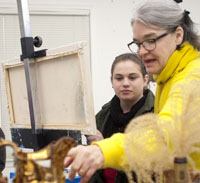Why I Give: Q&A With Meg Maguire '65

Meg Maguire '65
Q: Tell us a little about your life today.
A: My husband and I are retired, but we are as busy as ever. I am a trustee with the Committee of 100 on the Federal City, a 97-year-old planning advocacy organization for comprehensive planning issues including housing, transportation, parks and environment, zoning, and historic preservation. I am also very active in the First Congregational United Church of Christ at Metro Center in D.C.
A year ago we moved from our townhouse on beloved Capitol Hill to The Westchester, an Art Deco co-op near the National Cathedral. We are still dealing with boxes and decisions on hundreds of tangible photographs and memorabilia of a lifetime. (What will become of all the pictures now locked in computers when this generation of technology passes?)
We are deeply grateful for our many friends and family members and for meaningful work.
Q: What is your fondest memory from the College?
A: One of my fondest memories is working on FOCUS, a campus-wide symposium with a number of guest speakers, with Patsy Derby, '63—a real intellectual high.
The top memory is probably the year that I substituted for professor Shirley Strickland while she was on sabbatical. I taught several sociology courses, assigned far too many papers, and stayed up many nights trying to comment and grade them. At the end of that year, I married my first husband in a beautiful wedding in Mary's Garden complete with harpsichord, violin and a mockingbird who commented during the silent prayer. While the marriage didn't last, I still feel warm memories of the occasion at my alma mater.
Q: What was your favorite tradition?
A: I wasn't much of a traditionalist but did enjoy singing the lovely College songs and the academic processions on special occasions.
Q: Why do you support the College with a planned gift?
A: Randolph College provides the best education possible with its small classes, close faculty-student relationships, strong sense of community, emphasis on critical thinking and social justice, honor system, beautiful and walkable campus, and high-tech/high-touch/high-frequency approach to frequent communications and gorgeous publications. I know what this experience did for me, cultivating my strengths and providing help with weaknesses. I want such a quality liberal arts education for all young people.
Q: Why is it important for people to give to Randolph College?
A: Supporting Randolph College—the extraordinary leadership of Brad Bateman, the brilliant faculty and excellent staff, the well-tended campus and beautiful buildings—is a high-yield investment with benefits and consequences beyond our knowing. As the College implements its future on the cutting edge, more equipment, facilities and scholarships are a necessity. This is what our gifts make possible.
Q: What advice would you give to a new graduate?
A: Show Up. Step Up. Think critically. Act with compassion and generosity. Vita abundantior!
Support the Future of Our Students
Like Meg, you can make an impact on Randolph students in the future. Contact The Planned Giving Office at 434-485-8050 or plannedgiving@randolphcollege.edu to learn more.

